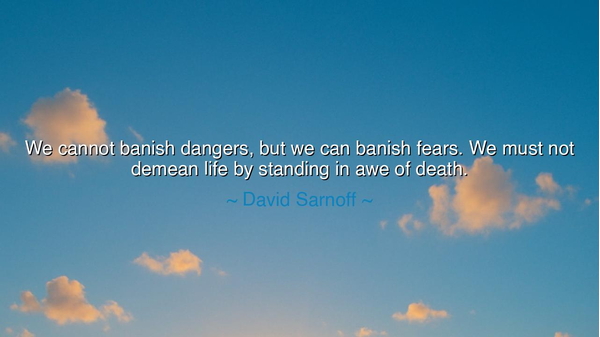
We cannot banish dangers, but we can banish fears. We must not
We cannot banish dangers, but we can banish fears. We must not demean life by standing in awe of death.






When David Sarnoff declared, “We cannot banish dangers, but we can banish fears. We must not demean life by standing in awe of death,” he spoke as one who had witnessed both the peril and promise of the human spirit. His words echo through time like the voice of a sage addressing a trembling world, urging us to remember that while the storms of fate may never be tamed, the heart that faces them can be. In this truth lies the essence of courage—that power is not found in escaping danger, but in confronting it without surrendering to fear. For danger belongs to the world, but fear is born within us; and it is within us that we must conquer it.
The origin of these words rests in the life of Sarnoff himself, a man who rose from humble beginnings to become a pioneer of modern communication. Born in poverty in a small village in Belarus, he emigrated to America and began his career as a telegraph operator. On the night the Titanic sank, it was young Sarnoff who received the desperate messages from the doomed ship, relaying them tirelessly for days without rest. He had seen death’s shadow close at hand, yet he did not shrink from his duty. Later, as the head of RCA, he led the world into the age of radio and television—tools that connected humanity even amid the chaos of war. His life was proof that fearlessness, not fortune, builds progress. To him, danger was constant, but fear was optional.
When Sarnoff warns that we “must not demean life by standing in awe of death,” he strikes at the very heart of human frailty. Too often, we live as if death were the master and life the servant—measuring our days not by what we give, but by what we might lose. Yet death, as the ancients taught, is not the enemy; it is merely the boundary that defines the beauty of living. To fear it is to live half a life, to exist in shadow rather than light. The wise do not bow before death; they honor it by living so fully that even the grave cannot diminish their radiance.
History has shown that those who achieve greatness are not those who live without danger, but those who live without fear. Consider Nelson Mandela, who spent twenty-seven years imprisoned in a small cell, facing the constant threat of death. Yet he emerged not broken, but whole, saying, “I learned that courage was not the absence of fear, but the triumph over it.” Like Sarnoff, he understood that fear enslaves the spirit far more than danger ever could. Mandela did not banish the peril of his cause—but he banished his fear of it, and thus freed not only himself, but a nation.
Sarnoff’s words are also a challenge to the modern soul, which seeks safety above all things. We surround ourselves with walls, devices, and illusions to ward off uncertainty. Yet no fortress can protect us from the truth that life itself is perilous. Every breath is a risk, every love a vulnerability, every dream a step into the unknown. But to avoid danger is to avoid life. To live fully, we must walk hand in hand with uncertainty, guided not by fear but by purpose. The person who embraces this truth ceases to be a victim of circumstance and becomes the master of his own fate.
Let us then learn from Sarnoff’s wisdom: to banish fear is not to feel no trembling in the heart, but to act despite it. It is to look upon death—not with awe, but with calm recognition—and to say, “You will not rule me.” To banish fear is to trust in the strength of the soul, to believe that life’s worth is not measured in its length but in its depth. Each act of courage, each refusal to yield to despair, is a small victory over death itself.
So, my children of the living world, hear this teaching: dangers will come as surely as night follows day. You cannot banish them, nor should you seek to. For it is through trial that the spirit grows strong, and through risk that the soul learns meaning. But fear—fear is the thief of days, the silent killer of dreams. Cast it from your heart. Stand upright before the uncertainties of life. Laugh, strive, create, love, and when death at last comes to call, greet it not as an enemy but as a familiar shadow. For you will have lived without demeaning life, and that is the truest victory of all.






AAdministratorAdministrator
Welcome, honored guests. Please leave a comment, we will respond soon